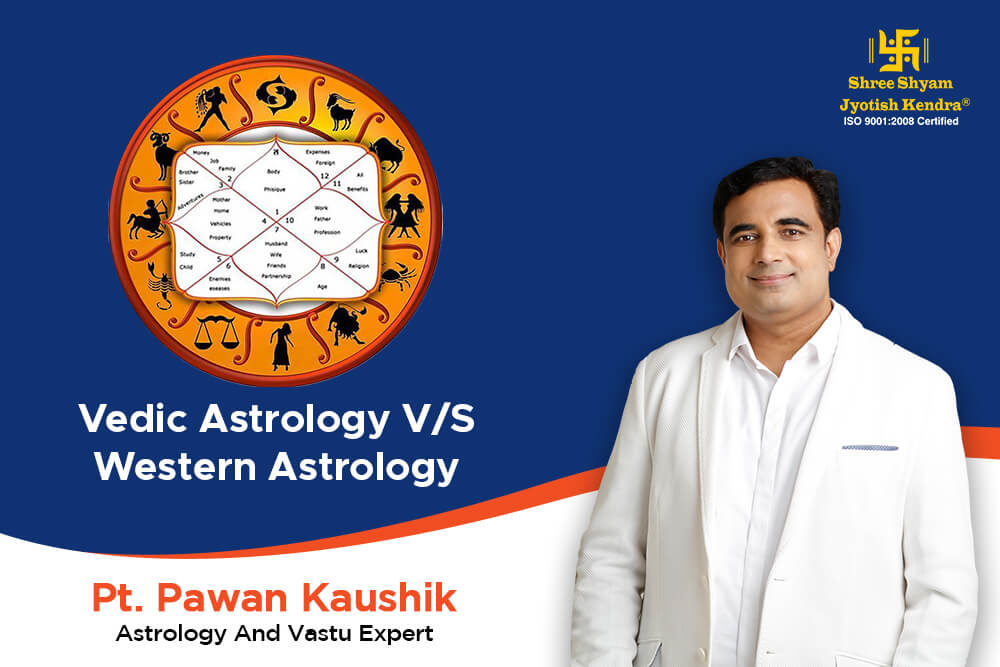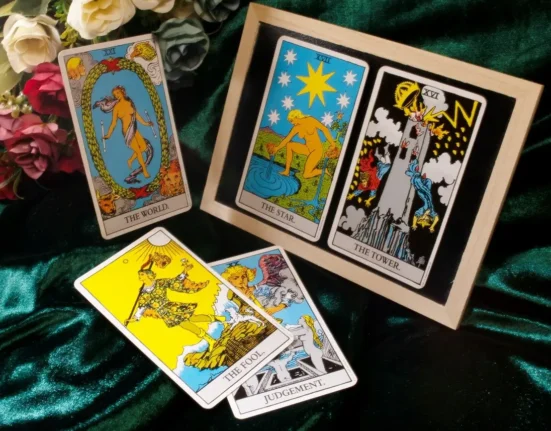Astrology follows you like your shadow in whichever part of the world you are. For Indians, astrological predictions are centred around the moon. At the same time, westerners feel more connected to the Sun. Indian astrology and Western astrology are the two primary branches of astrology that are widely known. Compared to Western Astrology, which is relatively new, Vedic Astrology has been practised for thousands of years and has written records in the Vedas.
Many people are curious about which of these two systems is superior because they both have their own distinctive qualities. In this blog post, we will look closely at the difference between Vedic and Western astrology and explore the superior one.
Pt Pawan Kaushik is the top astrologer in Gurgaon who has mastered both Vedic and Western astrology. In this industry, he has over 25 years of expertise. He is a well-known and exceptionally experienced astrologer, gemstone expert, and Vastu Shastra consultant. Pt Pawan Kaushik helped many people by giving them the best remedies, no matter the situation.

His kind and polite demeanour, as well as his optimistic outlook on life, are commendable. Being regarded as the best Jyotish in Gurgaon, he has gained the respect and admiration of both his clients and his contemporaries thanks to his passion and attention to his work.
What is Vedic Astrology?
Ancient Indian science known as Vedic Astrology explains how the motions and locations of the planets in relation to time affect people and other earthly beings. Vedic astrology has a long history that goes back thousands of years.
Early Vedic astrology focused solely on how planets moved in relation to stars, but later it began to incorporate the zodiac signs.
Vedic astrology claims that there are 27 constellations, each representing a different part of human existence. These constellations are made up of 12 zodiac signs, nine planets, and 12 houses. The 12 signs are divided among the 12 houses according to the time of birth, and the nine planets are positioned in various houses.
This visual presentation of the image of the signs and planets is called a horoscope chart. Vedic astrology solely analyses the significance of these configurations as they relate to people and other entities.
What is Western Astrology?
The most popular form of astrology in western nations is western astrology. Based on the specific moment and location of the event on Earth, horoscopes trace the locations of celestial objects.
The natal chart, which is based on the day, hour, and place of a person’s birth, is one of the most popular horoscope interpretations. The Sun sign, also known as the most well-known influence and the position of the Sun at birth, is just one of many components of western horoscopes.
The majority of expert astrologers in India utilise the tropical zodiac, which begins with the symbol of Aries at the Northern hemisphere Vernal Equinox, which occurs every year on or around March 21. Some Western astrologers use the Sidereal zodiac, which utilises actual star positions.
What is the Difference Between Vedic and Western Astrology?
After getting some information about Vedic and western astrology, let’s know their main differences.
Vedic astrology uses a different calendar
Western astrology bases its charts on the four seasons and the “tropical calendar,” which most of the world uses. On the other hand, Vedic astrology charts are produced using the sidereal approach, which considers the observable, constantly moving constellations. (Western astrology uses the fixed placements of the planets and does not change similarly.)
Vedic astrology has different approaches to retrogrades, rising, and sun signs
The two modalities interpret the meaning of a retrograde planet and the significance of particular planetary aspects differently. In Western astrology, every planet has the same kind of aspect— for example, a square, trine, sextile, or opposition.
However, Vedic astrology uses unique aspects—each planet has a distinct aspect or set of aspects, and various strengths are given to that particular aspect. Vedic astrology also places more value on your rising sign than your sun sign.
Vedic astrology speaks more to your karma and dharma
Another intriguing difference between Vedic and modern Western astrology is that Vedic astrology is focused on an individual’s karma, but modern Western astrology has grown more psychologically oriented.
Vedic astrology discloses your natural talents and obstacles and sheds light on your personal dharma or life path. It can improve the comprehension of your connections with your loved ones, friends, and spouses. This essential knowledge aids in reducing stress and your emotional highs and lows.
12 Western and Vedic Astrology Signs, Dates and Personality Traits
Now, let’s dive into something interesting. This point will explain 12 western and Vedic astrology zodiac signs, dates and personality traits.
First, let’s have a look at Modern Astrology Data
| Western Zodiac Sign | Birth Time | Personality Traits |
| Aries (Mesha) | March 21 -April 19 | Energetic, candid and willful |
| Taurus (Vrishabha) | April 20 – May 20 | Reliable, diligent and conservative |
| Gemini (Mithun) | May 21 – June 21 | Quick-witted, capricious and cheerful |
| Cancer (Karka) | June 22 – July 22 | Considerate, imaginative and sensitive |
| Leo (Simha) | July 23 – August 22 | Enthusiastic, proud and arrogant |
| Virgo (Kanya) | August 23 – September 22 | Elegant, perfectionist and picky |
| Libra (Tula) | September 23 – October 23 | Equitable, charming and hesitant |
| Scorpio (Vrishchika) | October 24 – November 22 | Insightful, mysterious and suspicious |
| Sagittarius (Dhanus) | November 23 – December 21 | Unconstrained, lively and rash |
| Capricorn (Makara) | December 22 – January 19 | Perseverant, practical and lonely |
| Aquarius (Kumbha) | January 20 – February 18 | Smart, liberalistic and changeful |
| Pisces (Meena) | February 19 – March 20 | Romantic, kind and sentimental |
Now, let’s see the dates used in Vedic Astrology
| Western Zodiac Sign | Birth Time | Personality Traits |
| Aries (Mesha) | April 13 – May 14 | Energetic, candid and willful |
| Taurus (Vrishabha) | May 15 – June 14 | Reliable, diligent and conservative |
| Gemini (Mithun) | June 15 – July 14 | Quick-witted, capricious and cheerful |
| Cancer (Karka) | July 15 – August 14 | Considerate, imaginative and sensitive |
| Leo (Simha) | August 15 – September 15 | Enthusiastic, proud and arrogant |
| Virgo (Kanya) | September 16 – October 15 | Elegant, perfectionist and picky |
| Libra (Tula) | October 16 – November 14 | Equitable, charming and hesitant |
| Scorpio (Vrishchika) | November 15 – December 14 | Insightful, mysterious and suspicious |
| Sagittarius (Dhanus) | December 15 – January 13 | Unconstrained, lively and rash |
| Capricorn (Makara) | January 14 – February 11 | Perseverant, practical and lonely |
| Aquarius (Kumbha) | February 12 – March 12 | Smart, liberalistic and changeful |
| Pisces (Meena) | March 13 – April 12 | Romantic, kind and sentimental |
Which is better: Vedic Astrology or Western Astrology?
It is clear from all these differences that each astrological system has its unique significance. Western astrology, however, employs a different approach that is much more akin to an open system and places less emphasis on conventional birth chart preparation techniques.
On the other hand, Vedic astrology uses traditional techniques as the foundation for calculation and analogies. We don’t use the outer planets because we can’t see them with our unaided eyes.
The best part about Vedic astrology is that it clearly links planets to energising elements like yoga, ayurveda, and many other significant Indian spiritual practices.
Western astrology, which places more emphasis on the Sun sign, which is fixed for one month, can occasionally provide strange results because Vedic astrology focuses more on the Moon sign, which is fixed for 2.25 days.
Ultimately, the selection of which approach of astrology to use comes down to personal preference. Some people may pick detailed and detailed predictions of Indian astrology, while others may want the general predictions of Western astrology.
It’s essential to remember that astrology should not be used as the only decision-making tool in life but can be used as a complementary tool to comprehend oneself and the universe better.
Conclusion
Both Vedic and Western astrology have their own individual features and can be used to give advice and predictions. The preference of which system to use comes down to personal choice, and both can be used as complementary tools to understand oneself and the universe better.





